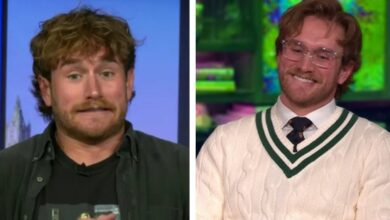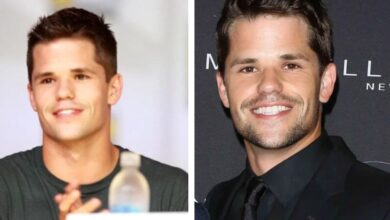Who Is Richard Mulligan? The Emmy-Winning American Character Actor of TV and Film

Richard Mulligan was a beloved American actor known for his impeccable comedic timing and heartfelt performances. With a career spanning over four decades, he became a household name through iconic TV roles like Burt Campbell in Soap and Dr. Harry Weston in Empty Nest. His talent earned him two Emmy Awards, cementing his legacy as one of television’s most memorable character actors.
Quick Bio
| Category | Details |
|---|---|
| Full Name | Richard Mulligan |
| Born | November 13, 1932, New York City, U.S. |
| Died | September 26, 1997 (aged 64), Los Angeles, California |
| Height | 6’3″ (Tall and lanky frame) |
| Notable Roles | Burt Campbell (Soap), Dr. Harry Weston (Empty Nest), Gen. Custer (Little Big Man) |
| Awards | 2 Primetime Emmy Awards (1980, 1989) |
| Spouses | Joan Hackett (1960–1963), Lenore Stevens (1965–1972), and two others |
| Children | Two sons, including actor James Mulligan |
| Net Worth | Estimated $3–5 million (at death, adjusted for inflation) |
| Acting Style | Physical comedy, exaggerated expressions, emotional depth |

Early Life and Background
Born in New York City in 1932, Richard Mulligan was the son of a schoolteacher and a sales manager. His early years were spent in the Bronx, where he developed an interest in acting. Initially, he pursued psychology at the University of Connecticut, but his passion for performing led him to shift toward theater.
Mulligan’s tall, expressive demeanor made him a natural fit for comedic and dramatic roles. His early struggles in New York’s competitive acting scene shaped his resilience, eventually leading him to off-Broadway productions in the 1950s.
Theater Career Beginnings

Before conquering television and film, Mulligan honed his craft on stage. He performed in various off-Broadway plays, showcasing his versatility in both comedy and drama. His theatrical background helped him develop a unique acting style—blending exaggerated physicality with deep emotional nuance.
By the 1960s, he transitioned to screen acting, landing minor roles in TV shows and films. His breakthrough, however, came with Arthur Penn’s Little Big Man (1970), where he played the eccentric General George Custer.
Television Breakthrough
Mulligan’s career skyrocketed with the satirical sitcom Soap, where he played Burt Campbell, a bumbling yet lovable husband caught in absurd situations. The show was groundbreaking for its serialized comedy format and controversial themes, pushing the boundaries of TV at the time.
His performance earned him his first Emmy Award in 1980, proving his ability to balance slapstick humor with genuine vulnerability. Soap remains a cult classic, with Mulligan’s portrayal of Burt being one of its most memorable aspects.
Film Career Highlights

While TV brought him fame, Mulligan’s film work was equally impressive. His role as General Custer in Little Big Man (1970) showcased his knack for playing eccentric characters. He collaborated with director Arthur Penn multiple times, including in The Boston Strangler (1968).
Iconic TV Role
After Soap, Mulligan solidified his TV legacy with Empty Nest, a Golden Girls spin-off where he played Dr. Harry Weston, a widowed pediatrician navigating life with his adult daughters. The role earned him his second Emmy in 1989, highlighting his evolution from slapstick to heartfelt comedy.
The show ran for seven seasons, making Mulligan a beloved sitcom dad. His chemistry with co-stars Dinah Manoff and Kristy McNichol added warmth to the series, ensuring its lasting popularity.
Accolades and Recognition
Mulligan’s talent was widely recognized:
- Two Primetime Emmy Awards (1980, 1989)
- Multiple Golden Globe nominations
- Praise for blending humor with emotional depth
Critics often noted his ability to make even the quirkiest characters relatable—a testament to his skill as a character actor.
Richard Mulligan’s Acting Style
What set Mulligan apart was his unique comedic delivery:
- Physical comedy (exaggerated gestures, facial expressions)
- Perfect timing (pausing for maximum effect)
- Emotional range (shifting from funny to touching effortlessly)
His evolution from broad comedy in Soap to the more nuanced Empty Nest demonstrated his versatility.
Net Worth and Career Earnings
At the time of his death in 1997, Mulligan’s net worth was estimated at $3–5 million (adjusted for inflation). His earnings came from:
- TV salaries (Soap, Empty Nest)
- Film roles
- Theater performances
While not among Hollywood’s wealthiest, his consistent work ensured financial stability.
Legacy and Influence
Richard Mulligan’s impact on TV comedy is undeniable. He paved the way for quirky, flawed protagonists in sitcoms, influencing later actors like Jason Alexander (Seinfeld) and Tony Shalhoub (Monk*).
Co-stars like Dinah Manoff and Katherine Helmond praised his generosity and talent. Even today, his performances in Soap and Empty Nest remain benchmarks for character acting.
Conclusion
Richard Mulligan was more than just a funny face—he was a master of his craft, seamlessly blending humor and heart. From Soap to Empty Nest, he left an indelible mark on television, earning Emmy Awards and audience love along the way.
Though he passed away in 1997, his work continues to entertain, proving that great character actors never truly fade away.
FAQs About Richard Mulligan
What was Richard Mulligan most famous for?
Richard Mulligan was best known for his Emmy-winning roles as Burt Campbell in Soap and Dr. Harry Weston in Empty Nest, making him a beloved TV icon.
How many Emmy Awards did Richard Mulligan win?
He won two Primetime Emmy Awards, one for Soap (1980) and another for Empty Nest (1989).
What was Richard Mulligan’s net worth?
At the time of his death, his estimated net worth was between $3–5 million, earned through TV, film, and theater work.
Did Richard Mulligan have any famous co-stars?
Yes, he worked with stars like Katherine Helmond (Soap) and Dinah Manoff (Empty Nest), who praised his comedic talent.
When did Richard Mulligan pass away?
He died on September 26, 1997, at the age of 64, leaving behind a legacy of memorable performances.
For More Info Visit: The Hollywood Reporters




